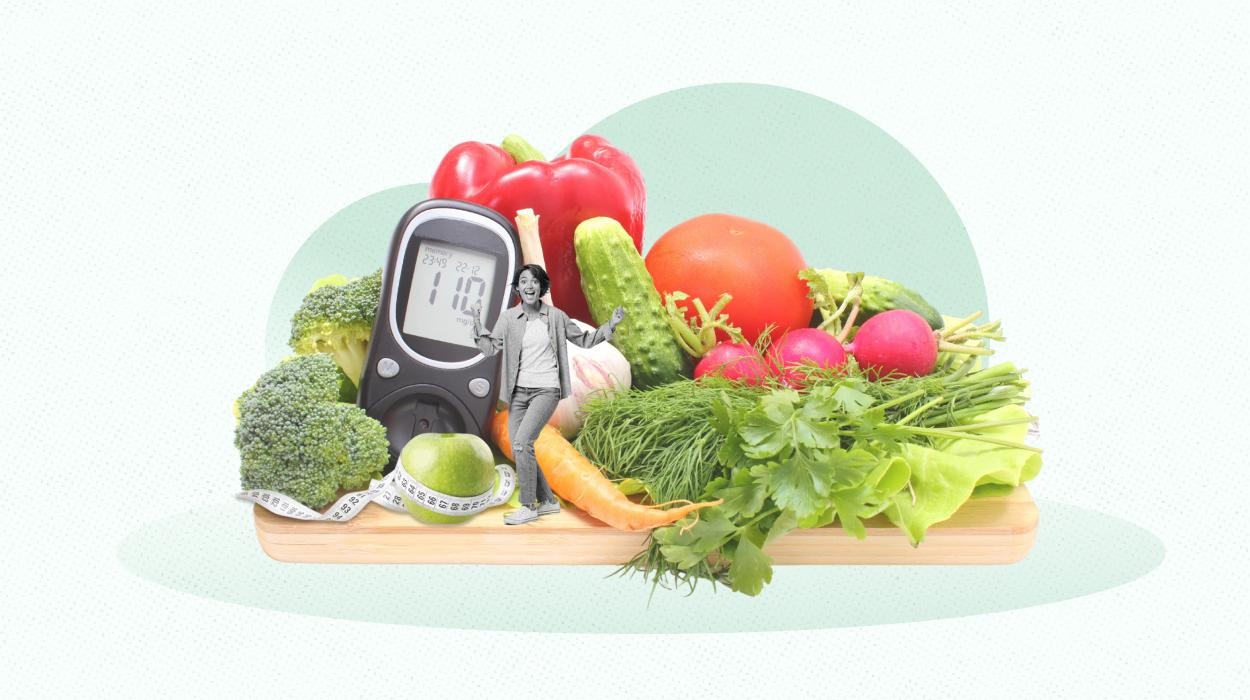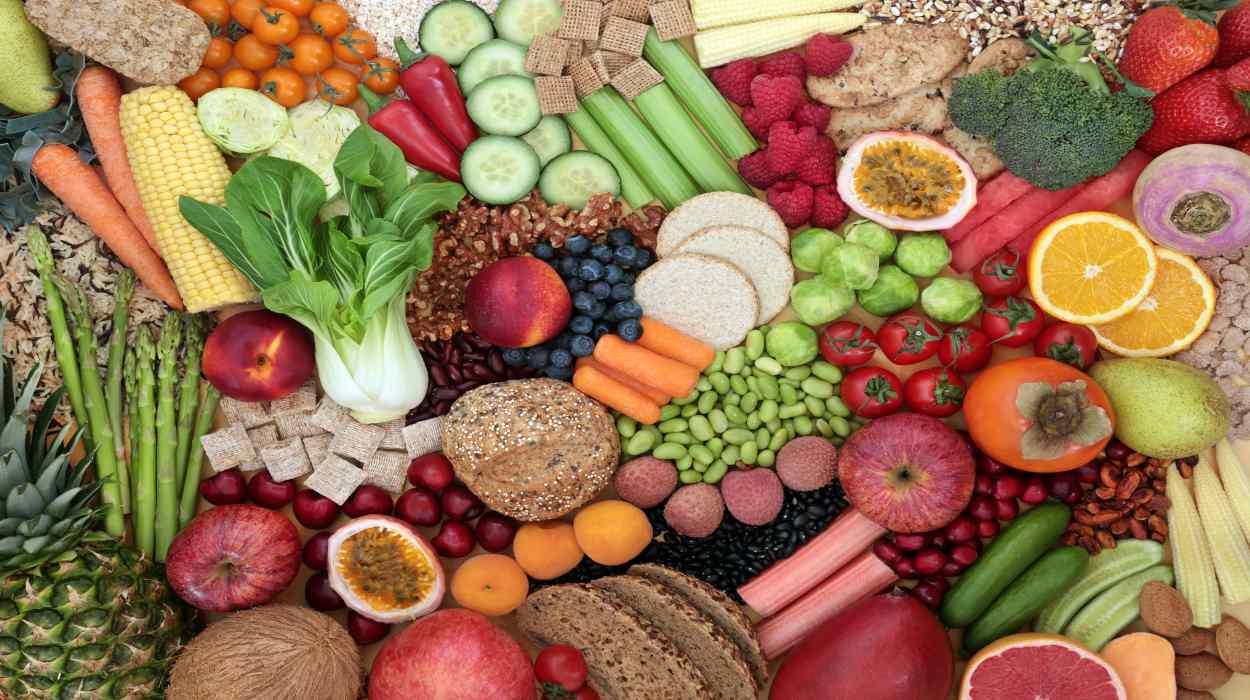 Expert's opinion
Expert's opinion
Expert's opinion
The article is a subjective view on this topic written by writers specializing in medical writing.
It may reflect on a personal journey surrounding struggles with an illness or medical condition, involve product comparisons, diet considerations, or other health-related opinions.
Although the view is entirely that of the writer, it is based on academic experiences and scientific research they have conducted; it is fact-checked by a team of degreed medical experts, and validated by sources attached to the article.
The numbers in parenthesis (1,2,3) will take you to clickable links to related scientific papers.
Plant Based Diet For Diabetes: Benefits & Guide For Beginners In 2024

Diabetes is a prevalent health condition characterized by the body’s inability to regulate blood sugar levels properly. This happens when the body cannot produce or effectively use insulin, a hormone responsible for managing your blood sugar. Fortunately, following a healthy diet, such as a healthy plant-based diet for diabetes, can help manage this condition.
Proper management of diabetes is crucial for overall health and achieving a healthy weight. If not properly managed, you may experience diabetes-related complications. Luckily, diabetes meal plans help regulate blood sugar levels by controlling your intake of carbohydrates, proteins, and fats.
A vegetarian, meal plan for diabetes risk management combines the principles of a low-fat vegetarian diet for diabetes with the advantages of a plant-based eating pattern. It focuses on portion control, balanced nutrition, and the consumption of low glycemic index foods – foods that digest more slowly and are less likely to cause a rapid rise in blood sugar.
In this article, we will delve into the benefits of the vegetarian diet for diabetes and guide you in creating a well-rounded vegan, diet plan to improve blood sugar control and help you lose weight.
Plant-Based Diet For Diabetes Menu
A Plant-Based Diet For Diabetes: A Sample Meal Plan
If you’re looking for an example, here is a sample meal plan for a vegetarian diet for diabetes. Remember to consult your doctor or registered dietitian to tailor the meal plan to your specific needs and goals.
Plant-Powered Day: Energize Your Body the Vegan Way (approx. 1,150 calories)
This day is designed to showcase the delicious possibilities of a plant-based diet while providing your body with essential nutrients and energy. Whether you’re new to plant-based eating or looking for some fresh ideas, these meals will leave you feeling revitalized and satisfied.
| Breakfast | |
| Cooked steel-cut oats | 1/2 cup |
| Mixed berries (blueberries, raspberries, strawberries) | 1/4 cup |
| Chopped walnuts | 1 tbsp |
| Unsweetened almond milk | 1 cup |
| Lunch | |
| Mixed greens salad (spinach, arugula, lettuce) with cherry tomatoes, cucumber, and shredded carrots. | 1 cup |
| Cooked quinoa | 1/2 cup |
| Chickpeas | 1/2 cup |
| Sliced avocado | 1/4 |
| Sunflower seeds | 2 tbsps |
| Olive oil and balsamic vinegar dressing | 1 tbsp |
| Dinner | |
| Vegetable stir-fry (broccoli, bell peppers, zucchini, and onions) cooked with 1 tablespoon of sesame oil and low-sodium soy sauce | 1 cup |
| Cooked brown rice | 3/4 cup |
| Cubed tofu, marinated in a mixture of low-sodium soy sauce, garlic, and ginger, then sautéed or baked | 1/2 cup |
Health Benefits Of The Plant-Based Diet For Diabetes
A diagnosis of type 1 or 2 diabetes causes a complete shift in our lives and that of our loved ones. You often struggle to find a new balance between your old and new lifestyle.
A common example is balancing dietary choices and managing blood sugar levels. You may have tried various diets and approaches. Now, you come across and want to explore a diabetes plant-based diet.
A vegetarian diet for diabetes[1] is an approach to eating that does not include meat, fish, poultry, or any products containing these foods. It is based on plant foods such as grains, vegetables, fruits, legumes, nuts, and seeds.
For best results, this diet should also consume superfoods for diabetes, which are foods that are highly nutritious and promote health. Some vegetarians may also choose to consume dairy products and eggs.
You may be curious about a diabetes vegetarian diet due to its numerous health benefits. It offers a great way to manage diabetes and stay healthy and may also be helpful in the prevention of diabetes.[2] Plant-based foods offer:
- Better Blood Sugar Control: Vegetarian diets, particularly those rich in high-fiber foods and plant protein, can help stabilize blood sugar levels[3] and improve glycemic control.
- Weight Management: Vegetarian diets are lower in saturated fat and can aid in weight loss or maintenance.[4] Achieving a healthy weight is crucial for people with diabetes, as it can help improve insulin sensitivity and reduce the risk of complications.
- Lower Risk Of Heart Disease: Vegetarian diets are associated with lower cholesterol levels and blood pressure, which can reduce cardiovascular risk factors. Since people with diabetes have a higher risk of heart issues, a vegetarian diet can benefit heart health.[5]
- Reduced Inflammation: Vegetarian diets are rich in antioxidants and anti-inflammatory compounds. Therefore, a vegetarian diet can mediate the inflammation symptoms[6] associated with the condition and overall health.
Increased Nutrient Intake: Vegetarian and vegan diets are often rich in healthy fats, minerals, and vitamins. You can benefit from these nutrients and other diet modifications, such as adding protein supplements.
Can People With Diabetes Follow A Vegetarian Diet?
Yes, people with diabetes can follow a vegetarian diet. Research shows that following a vegetarian diet can help individuals better manage their diabetes. Plant-based meal plan diets have also been shown to help prevent type 2 diabetes.
A well-balanced vegetarian diet can provide all the necessary nutrients and help stabilize blood sugar levels. The best way to achieve these benefits is by focusing on high-fiber foods, healthy fats, and protein sources such as beans, lentils, nuts, seeds, and yogurt.
Plant-Based Food For Diabetes

Contrary to what you might expect, a vegetarian diet for diabetes is quite versatile. Here are some plant-based foods to include:
- Whole grains: Brown rice, barley, whole wheat pasta, whole grain bread, and oats are excellent sources of fiber and nutrients. They have a lower glycemic index than refined grains, which can manage blood sugar levels.
- Legumes: Beans, lentils, chickpeas, and peas are rich in protein, fiber, and essential nutrients. They can help stabilize blood sugar levels[7] and keep you feeling full longer.
- Vegetables: Leafy greens, broccoli, cauliflower, bell peppers, tomatoes, and zucchini are examples of non-starchy vegetables[8] for blood sugar control.
- Fruits: Berries, apples, pears, oranges, and cherries are low-glycemic fruits that can be included in a diabetic diet.[9] They provide essential vitamins, minerals, and antioxidants. For instance, orange juice has vitamin C,[10] which is a great vitamin for diabetes.
- Nuts and seeds: Almonds, walnuts, chia seeds, flaxseeds, and pumpkin seeds are nutrient-dense sources of healthy fats, proteins, and fiber. They can help improve and manage blood sugar levels.[11]
- Plant-based protein sources: Tofu, tempeh, edamame, and seitan are excellent protein sources for vegetarians.[12] They can be used in various dishes and help maintain a balanced diet.
- Dairy alternatives: Plant-based Greek yogurt, cottage cheese, and cheese are included and can be made from almond, soy, or cashew milk. These can be included in a vegetarian diet containing protein like animal products.
What Foods To Avoid
The goal of a vegetarian diet for diabetes is to achieve a healthy body weight and improve blood sugar control. This may mean cutting out certain foods such as:
- Processed foods: Highly processed foods, such as fast foods and snack foods, tend to be low in nutrients and high in calories. They also are more likely to cause a rise in blood sugar[13] because of their poor nutritional value.
- Sugary beverages: Sodas, fruit juices, and energy drinks are high in sugar and can increase blood sugar levels.[14] Choose water, herbal teas, or sugar-free beverages as healthier alternatives.
- High-sodium foods: Excessive sodium intake can lead to high blood pressure, a risk factor for heart disease and diabetes.[15] Limit your consumption of high-sodium foods, such as canned soups, processed meats, and salty snacks to 1,500 mg daily.
Vegetarian Diet For Each Type Of Diabetes
There are three main types of diabetes Type 1, 2, and gestational diabetes. A vegetarian diet can be adapted for each type of diabetes listed above. Here are some tips for a vegetarian diet for type 1, type 2, and gestational diabetes:
Type 1 Diabetes
Type 1 is an autoimmune condition where the body cannot produce insulin. For this type of diabetes, monitoring carbohydrate intake and adjusting insulin doses accordingly is crucial. Focus on:
- Low glycemic index carbohydrates: Whole grains, legumes, and non-starchy vegetables help prevent rapid blood sugar spikes.
- Plant-based proteins: Tofu, tempeh, edamame, and legumes provide essential amino acids without contributing to carbohydrate load.
- Healthy fats: Nuts, seeds, avocados, and olive oil contain anti-inflammatory fats to support heart health.
In addition to following this diet, you should track your carbohydrate intake and adjust insulin doses based on your healthcare professional’s recommendations.
Type 2 Diabetes
Type 2 is the most common form of diabetes, where the body develops insulin resistance or doesn’t produce enough. Type 2 diabetes management often involves lifestyle changes that include diet modifications. A vegetarian diet for type 2 diabetes should focus on the following:
- Weight management: Choose nutrient-dense, low-calorie foods such as green vegetables, whole grains, and plant-based proteins.
- Balanced meals: Combine carbohydrates, proteins, and healthy fats in each meal to balance macronutrients.
- Portion control: Monitor portion sizes to prevent overeating and manage blood sugar levels effectively. This can also aid in weight management.
Other lifestyle goals include incorporating physical activity into your daily routine to improve insulin sensitivity and overall health.
Gestational Diabetes
Gestational diabetes occurs during pregnancy and requires careful management for both mother and child. A vegetarian diet for gestational diabetes should include the following:
- Balanced nutrition: Ensure adequate protein, iron, calcium, and other essential nutrients for both mother and baby.
- Controlled carbohydrate intake: Spread carbohydrate intake evenly throughout the day to prevent blood sugar spikes.
- Healthy snacks: Choose low glycemic index snacks, such as nuts, seeds, and yogurt to maintain stable blood sugar levels between meals.
- Regular monitoring: Keep track of your blood sugar levels and consult with a healthcare professional to adjust your diet or medications as needed.
Potential Drawbacks Of The Vegan Diabetic Diet
A vegan diet for diabetes offers numerous benefits. However, we should consider the potential drawbacks. For instance, plant-based diets, if not properly planned, can be deficient in certain essential nutrients,[16] such as B12, protein, and calcium.
The Bottom Line
A vegetarian, diet for diabetes can be a nutritious and effective way to reduce the risk of cardiovascular disease, reduce diabetes-related complications, manage blood sugar levels, and promote overall health. It can aid in weight management, improve insulin sensitivity, and provide essential nutrients.
+ 16 sources
Health Canal avoids using tertiary references. We have strict sourcing guidelines and rely on peer-reviewed studies, academic researches from medical associations and institutions. To ensure the accuracy of articles in Health Canal, you can read more about the editorial process here
- Pawlak, R. (2017). Vegetarian Diets in the Prevention and Management of Diabetes and Its Complications. [online] 30(2), pp.82–88. doi:https://doi.org/10.2337/ds16-0057.
- Olfert, M.D. and Wattick, R.A. (2018). Vegetarian Diets and the Risk of Diabetes. [online] 18(11). doi:https://doi.org/10.1007/s11892-018-1070-9.
- Adisty Pavitasari, Farapti Farapti, Qonita Rachmah and Kalpana, C.A. (2022). Fiber Intake and Vegan Lifestyle Behaviour on Blood Glucose Control in Type 2 Diabetes Mellitus Patients: A Case-Control Study. [online] 19(5). doi:https://doi.org/10.2174/1573399819666220810164637.
- Tran, E., Hanna Fjeldheim Dale, Jensen, C. and Gülen Arslan Lied (2020). Effects of Plant-Based Diets on Weight Status: A Systematic Review. [online] Volume 13, pp.3433–3448. doi:https://doi.org/10.2147/dmso.s272802.
- Lee, K.-F., Hong Chuan Loh, Siew Mooi Ching, Navin Kumar Devaraj and Fan Kee Hoo (2020). Effects of Vegetarian Diets on Blood Pressure Lowering: A Systematic Review with Meta-Analysis and Trial Sequential Analysis. [online] 12(6), pp.1604–1604. doi:https://doi.org/10.3390/nu12061604.
- Deledda, A., Muscogiuri, G., Gian Carlo Tenore, Palmas, V., Manzin, A. and Velluzzi, F. (2021). Diet-Derived Antioxidants and Their Role in Inflammation, Obesity and Gut Microbiota Modulation. [online] 10(5), pp.708–708. doi:https://doi.org/10.3390/antiox10050708.
- Mullins, A. and Arjmandi, B.H. (2021). Health Benefits of Plant-Based Nutrition: Focus on Beans in Cardiometabolic Diseases. [online] 13(2), pp.519–519. doi:https://doi.org/10.3390/nu13020519.
- Tan Shot Yen, Min Kyaw Htet, Widjaja Lukito, Saptawati Bardosono, Rianto Setiabudy, Endang Basuki, Aris Wibudi, Drajat Martianto, Imam Subekti and Umi Fahmida (2022). Increased vegetable intake improves glycaemic control in adults with type 2 diabetes mellitus: a clustered randomised clinical trial among Indonesian white-collar workers. [online] 11. doi:https://doi.org/10.1017/jns.2022.41.
- Do Hyun Park (2021). Fruit Intake to Prevent and Control Hypertension and Diabetes. [online] 42(1), pp.9–16. doi:https://doi.org/10.4082/kjfm.20.0225.
- Dludla, P.V., Nkambule, B.B., Nyambuya, T.M., Khanyisani Ziqubu, Mabhida, S.E., Vuyolwethu Mxinwa, Kabelo Mokgalaboni, Fransina Ndevahoma, Hanser, S., Mazibuko-Mbeje, S.E., Albertus Kotze Basson, Jacopo Sabbatinelli and Tiano, L. (2022). Vitamin C intake potentially lowers total cholesterol to improve endothelial function in diabetic patients at increased risk of cardiovascular disease: A systematic review of randomized controlled trials. [online] 9. doi:https://doi.org/10.3389/fnut.2022.1011002.
- Agathi Ntzouvani, Smaragdi Antonopoulou and Nomikos, T. (2019). Effects of nut and seed consumption on markers of glucose metabolism in adults with prediabetes: a systematic review of randomised controlled trials. [online] 122(04), pp.361–375. doi:https://doi.org/10.1017/s0007114519001338.
- Eze, N.M., Okwume, U.G., Chiedu Eseadi, Udenta, E.A., Onyeke, N.G., Ugwu, E., Akubue B, Njoku, H.A. and Amaka Bibian Ezeanwu (2018). Acceptability and consumption of tofu as a meat alternative among secondary school boarders in Enugu State, Nigeria. [online] 97(45), pp.e13155–e13155. doi:https://doi.org/10.1097/md.0000000000013155.
- Tseng, T.-S., Lin, W.-T., Gonzalez, G.V., Kao, Y.-H., Chen, L.-S. and Lin, H.-Y. (2021). Sugar intake from sweetened beverages and diabetes: A narrative review. [online] 12(9), pp.1530–1538. doi:https://doi.org/10.4239/wjd.v12.i9.1530.
- Costa, C.S., Rauber, F., Paula, Sangalli, C.N., Dal, P. and Vitolo, M. (2019). Ultra-processed food consumption and its effects on anthropometric and glucose profile: A longitudinal study during childhood. [online] 29(2), pp.177–184. doi:https://doi.org/10.1016/j.numecd.2018.11.003.
- Laura Ferreira Provenzano, Stark, S., Steenkiste, A.R., Piraino, B. and Mary Ann Sevick (2014). Dietary Sodium Intake in Type 2 Diabetes. [online] 32(3), pp.106–112. doi:https://doi.org/10.2337/diaclin.32.3.106.
- Dimitra Rafailia Bakaloudi, Halloran, A., Rippin, H.L., Artemis Christina Oikonomidou, Theodoros Dardavesis, Williams, J., Kremlin Wickramasinghe, Breda, J. and Chourdakis, M. (2021). Intake and adequacy of the vegan diet. A systematic review of the evidence. [online] 40(5), pp.3503–3521. doi:https://doi.org/10.1016/j.clnu.2020.11.035.



